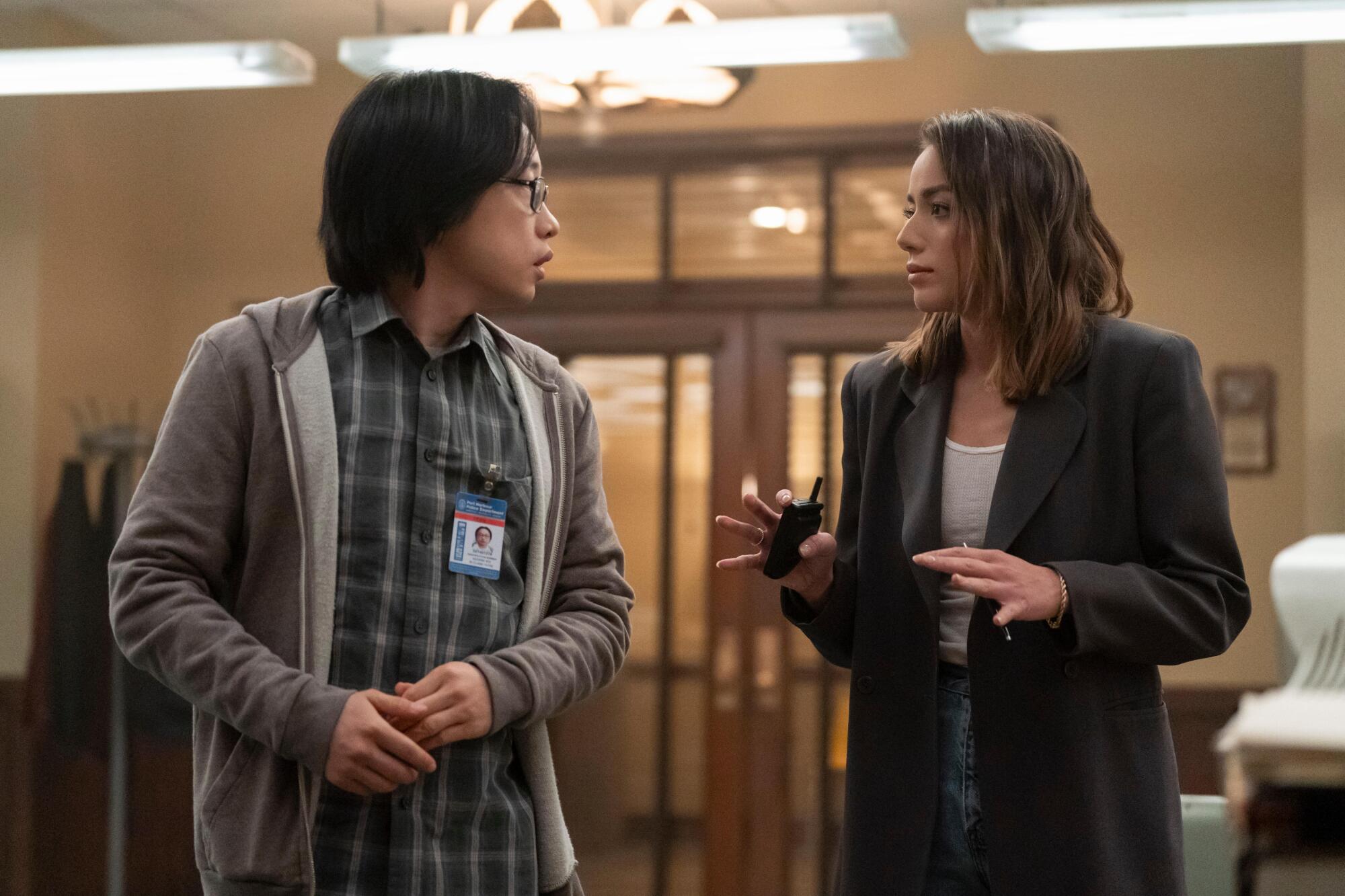Chloe Bennet co-stars in Hulu’s “Interior Chinatown,” Charles Yu’s sequence based mostly on his novel of the identical title.
(Annie Noelker / For The Instances)
Det. Lana Lee, performed by Chloe Bennet, stirs debate virtually as quickly as she seems on display in Hulu’s “Interior Chinatown.”
The sequence, premiering Tuesday, was created by Charles Yu, and is a extremely stylized adaptation of his Nationwide E-book Award-winning novel of the identical title. It’s set in two universes: One is a send-up of the Wolf Leisure-produced crime procedurals which have lengthy dominated NBC’s lineup; the opposite is centered on Willis Wu (Jimmy O. Yang), a waiter slumming it at a Chinatown restaurant.
Willis has all the time felt like he’s a background participant in others’ tales, till he witnesses a criminal offense.
Willis is starstruck the second he sees Lana on a tiny TV display at work, as servers and desk cleaners push round him. Who is that this sensible and delightful lady? Can she assist him overlook about his life in Chinatown? However his much less pushed co-workers, which embody finest pal Fatty Choi (performed by comic Ronny Chieng), are centered on one thing else: her race, which they’re attempting to discern.

Willis Wu (Jimmy O. Yang) and Lana Lee (Chloe Bennet) in a scene from Hulu’s “Interior Chinatown.”
(Mike Taing / Hulu)
It’s harking back to one other scene that featured Bennet. In Season 3 of FXX’s comedy “Dave,” she performs Robyn, a photographer and girlfriend of the eponymous rapper within the sequence. The evening they meet, Dave asks whether or not she’s Latina.
Bennet, born in Chicago as Chloe Wang — her mom is white and her father is Chinese language — is used to those feedback. She ultimately took her father’s first title as her stage surname after she had bother reserving roles. She defined her determination in a viral 2017 Instagram remark and in subsequent interviews, saying {that a} casting director informed her, “You’re not quite white enough for the [lead] role, but you’re not quite Asian enough for the best friend role.”
“I’m kind of used to my identity being cannon fodder,” Bennet says in a current Zoom interview. “It’s like open territory for people to have a fun game of guessing what I could be or what I could not be, or how much I am of something.”
There are additionally projections that Bennet has witnessed, akin to questions on her dad’s masculinity.
“The thing about internalized projections is you chalk your self-worth up to being … all right with it. But it really does put you in a position of feeling not whole,” she provides, saying that there are goal advantages to being white passing. “But that’s only if you’re thinking about existing in a flawed society. You can’t build up your psyche and your understanding of yourself based off of something that actually is arbitrary.”

“I’m kind of used to my identity being cannon fodder,” Bennet says. “It’s like open territory for people to have a fun game of guessing what I could be or what I could not be, or how much I am of something.”
(Annie Noelker / For The Instances)
These discussions had been among the many speaking factors each in “Interior Chinatown” and behind the scenes. Yu compares his e-book and TV present to “The Matrix” movies, saying that “in the world of this show, reality looks a certain way. It doesn’t look like how we see it because we’re watching it from the outside and they’re experiencing it differently.”
Lana, he says, “understands that there are certain rules and patterns and structure to things that Willis is only beginning to understand. And that’s part of what we’re watching in the course of the story.”
(Additionally, for these questioning: No, Dick Wolf has not contacted Yu about his e-book or the sequence. “I live in fear but also excitement at the idea that he might actually watch this,” Yu says. “What I want to say to Mr. Wolf, if he reads this, is that his creative product has entertained me for hundreds of hours, And that comes through in a satirical nature.”)
The model of the character from the e-book, who is called Karen, can also be biracial. Yu says that’s to point out that she will be able to, for higher or worse, navigate between a procedural the place cardboard cop characters take out organized crime in roughly 44 minutes and one other actuality, the place a waiter searches for his identification.
“It’s important that she seems plausible as somebody who could pass,” Yu says. “That’s the idea in the book and that’s the idea from real life [because] for a long time, there was this, I don’t know if you call it a practice, but reality for certain actors. If a show wanted to have people give some vague whiff of ethnicity, then they could cast someone [like Chloe] and push them in whatever direction.”

Charles Yu, writer of “Interior Chinatown” and creator of the TV sequence, on casting Chloe Bennet for the position of Lana Lee, who’s biracial: “It’s important that she seems plausible as somebody who could pass.”
(Mike Taing / Hulu)
The TV model of this character has extra attributes, partly as a result of Yu says Bennet made him ponder questions concerning the character’s backstory. She says she needed to create sufficient layers to the efficiency in order that anybody who rewatches the present after understanding the twist will nonetheless discover surprises and that this character who’s compelled to straddle two worlds “has had this identity crisis and that’s the most consistent thing about her.”
“Chloe is tactile and she has a way of making things more grounded and trying to find the reality for herself through small details,” Yu says, explaining that they’d discuss what the within of the character’s automobile or condominium would appear to be.
Bennet, whose resume features a starring position in ABC’s “Agents of S.H.I.E.L.D.” and a quick stint as a pop star in China — watch the video for her music “Uh Oh” if you wish to see her giving robust Christina Aguilera vitality — admits that she’s been obsessive about this character and story since she learn “Interior Chinatown.”

“He woke up a part of me that was dormant in my psyche as a product of trying to navigate my racial identity in the industry,” Bennet says about Yu and his novel, “Interior Chinatown.”
(Annie Noelker / For The Instances)
“Everyone has that [moment] when you click with an author and go, ‘Oh, my God, this person has been able to communicate these really, really sticky and diluted thoughts that I’ve had in my head for years that kind of have dust on them,’ ” she says. “He woke up a part of me that was dormant in my psyche as a product of trying to navigate my racial identity in the industry. … You know, I didn’t go to college. I left high school. I have a GED from, like, a parking lot in Santa Monica. My brain grew up on TV, and so my understanding of myself was very much shaped around [what I saw of] my identity on screen.”
“Interior Chinatown” didn’t have an on-set therapist, however Bennet jokes that she offers loads of cash to her personal.
After the 2016 presidential election, she co-founded RUN AAPI (Characterize Us Now), a corporation meant to assist with Asian American and Pacific Islander illustration each on and off display. However after being very concerned within the lead-up to the 2020 election, and feeling fatigued, she selected to take a step again from the group. However now, like a variety of Individuals, she is conflicted about whether or not she ought to have finished extra within the lead-up to the 2024 election.
As for what’s subsequent in her profession, she’s engaged on creating a brand new undertaking, although she doesn’t present specifics. Yu says there’s potential for a second season, however audiences must watch to see what it’d imply for Bennet’s character.
“I’ve been a vessel for a lot of different things, and I am much more interested in developing my own stories,” she says.
And like her “Interior Chinatown” character, she’s more likely to get individuals’s consideration.




